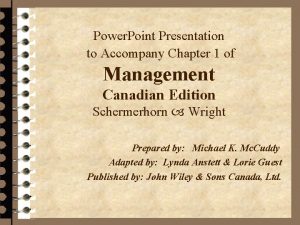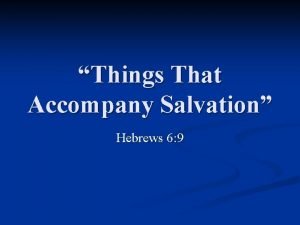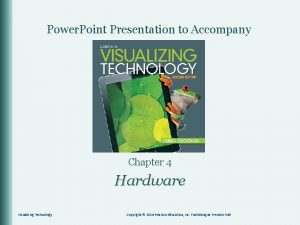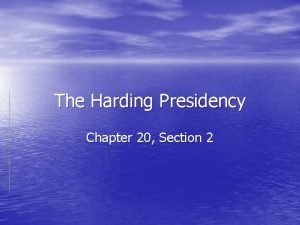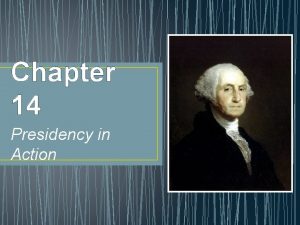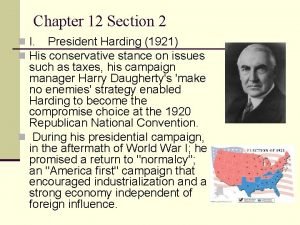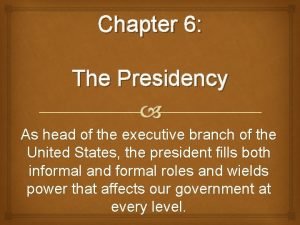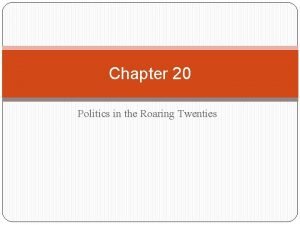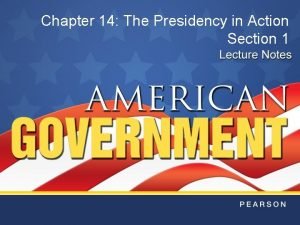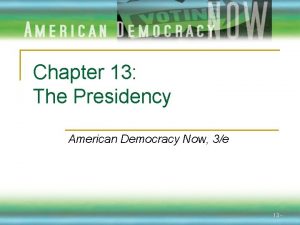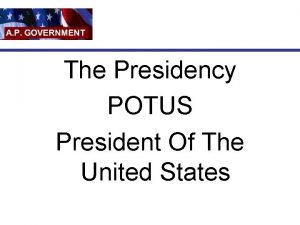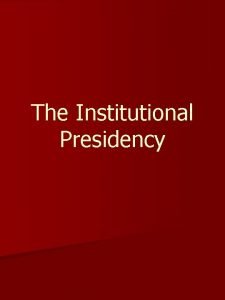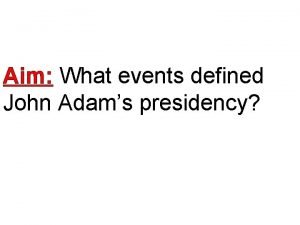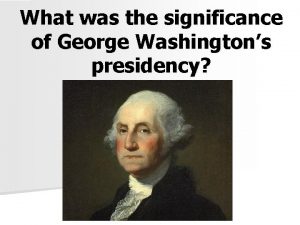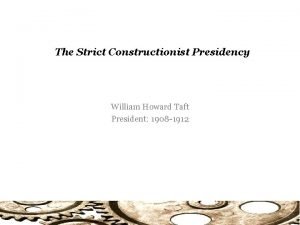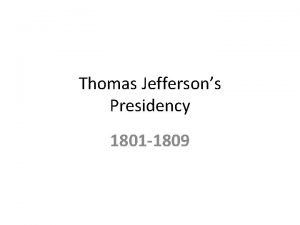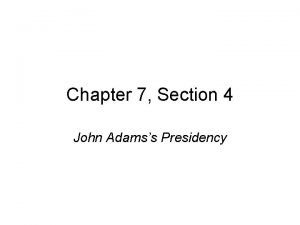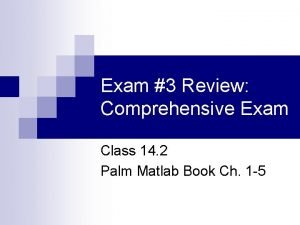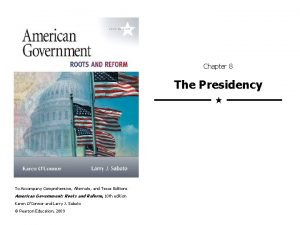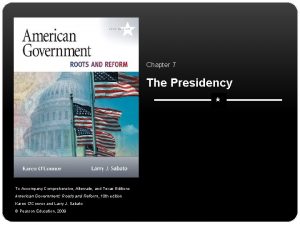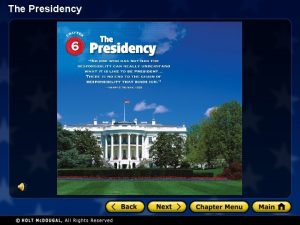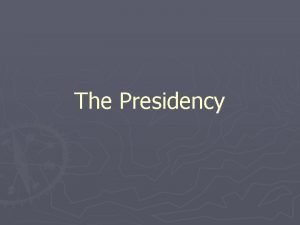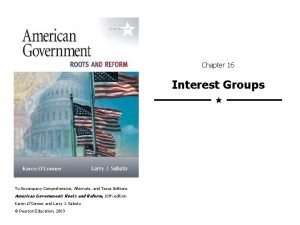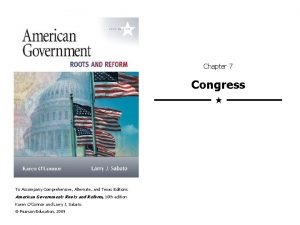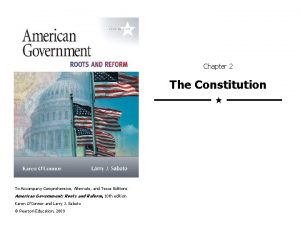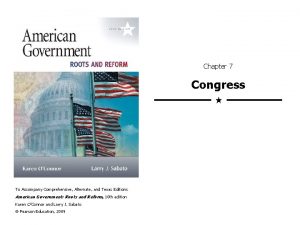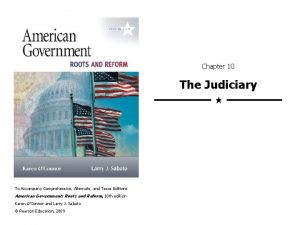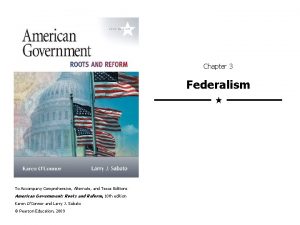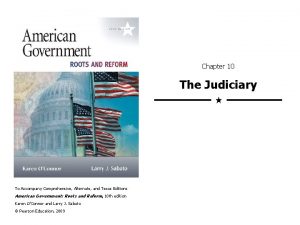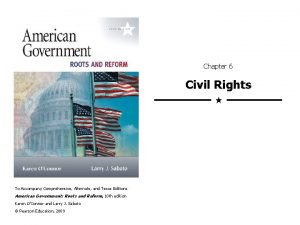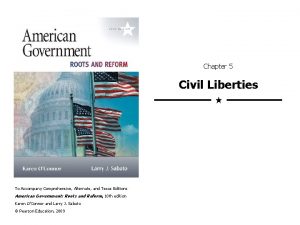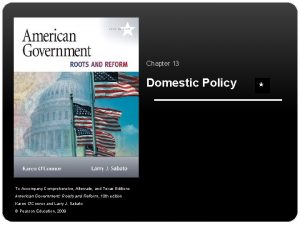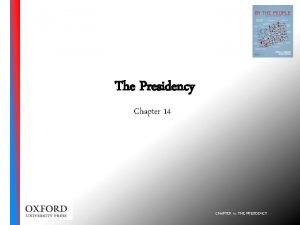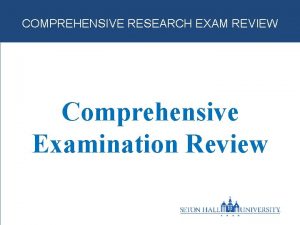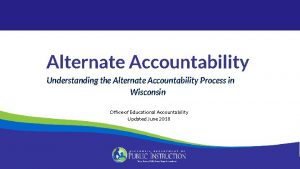Chapter 8 The Presidency To Accompany Comprehensive Alternate
























- Slides: 24

Chapter 8 The Presidency To Accompany Comprehensive, Alternate, and Texas Editions American Government: Roots and Reform, 10 th edition Karen O’Connor and Larry J. Sabato Pearson Education, 2009

Roots of the Presidency No chief executive under Articles of Confederation. Natural-born citizen, 35 years old. Two four-year terms, per Twenty-Second Amendment. Little attention to vice president. Can be impeached by Congress. Order of succession in Twenty-Fifth Amendment.

Constitutional Powers More limited than Article I powers of Congress. Appointments to executive, Cabinet, and judiciary. Convene Congress. Make treaties or executive agreements. Veto legislation; no line-item veto. Act as commander in chief of armed forces. Pardon individuals accused of crimes.

Roles of the President Chief law enforcer. Leader of the party. Commander in chief. Shaper of domestic policy. Player in legislative process. Chief of state.

Establishing Presidential Power George Washington sets precedent. Claimed inherent powers for national government. John Adams and Thomas Jefferson follow lead. Andrew Jackson asserts power through veto. Abraham Lincoln uses Civil War to expand office. Franklin D. Roosevelt’s New Deal ushers in new era.

Presidential Establishment Growing power of the vice president. Cabinet advisors to deal with a variety of issues. First ladies act as informal advisors. Executive Office of the President. White House staff directly responsible to president.

Presidential Leadership ability and personality can be key. “Power to persuade. ” Bully pulpit and going public. Approval ratings can help or hinder.

President as Policy Maker FDR is first president to send policy to Congress. Very difficult to get presidential policies passed. Ability to get desired budget passed helps. Office of Management and Budget plays key role. Use of executive order to avoid Congress.

AV- Presidential Approval Back

Table 8. 1 - U. S. Presidents Back

Table 8. 2 - Presidential Succession Back

Table 8. 3 - Women on Presidential Teams Back

Table 8. 4 - Treaties Back

Table 8. 5 - Presidential Vetoes Back

Table 8. 6 - Best and Worst Presidents Back

Table 8. 7 - U. S. Cabinet Back

Table 8. 8 - Presidential Personalities Back

7 Vice President of the United States Speaker of the House President pro tempore of the Senate Secretary of State Secretary of the Treasury Secretary of Defense Attorney General 8 Secretary of the Interior 9 Secretary of Agriculture 10 Secretary of Commerce 11 Secretary of Labor 12 Secretary of Health and Human Services 13 Secretary of Housing and Urban Development 14 Secretary of Transportation 1 2 3 4 5 The first four are set in the Constitution. The remaining are by date of originating the office. 6 15 16 16 17 Secretary Affairs Secretary Security of Energy of Education of Veterans of Homeland Back

No person shall be elected to the office of the President more than twice, and no person who has held the office of President, or acted as President, for more than two years of a term to which some other person was elected President shall be elected to the office of the President more than once. But this article shall not apply to any person holding the office of President when this article was proposed by the Congress, and shall not prevent any person who may be holding the office of President, or acting as President, during the term within which this article becomes operative from holding the office of President or acting as President during the remainder of such term. Back

Line Item Veto Declared illegal by the Supreme Court because there is an not any documentation in the Constitution giving this power to the President Back

Pardon A pardon is the forgiveness of a crime and the cancellation of the relevant penalty ; it is usually granted by the President Ford pardoned Nixon so he wouldn’t face criminal charges. President Carter pardoned the “Vietnam Era Draft Dodgers” so they could return to America and lead productive life as citizens. Back

Inherent Powers granted to the President, especially in foreign relations and national security, that are not subject to legislative or judicial restrictions. Back

Office of Management and Budget Assists the President in overseeing the preparation of the Federal budget and in supervising its administration in Federal agencies. Back

Executive Orders The president of the United States has the authority to create laws or determine how existing laws should be carried out. It always has to to do with domestic affairs; executive agreements govern foreign affairs. Back
 Accompany chapter 1
Accompany chapter 1 Things that accompany salvation
Things that accompany salvation Lymphatic drainage of upper limb
Lymphatic drainage of upper limb Inkjet printers are considered legacy technology
Inkjet printers are considered legacy technology Chapter 12 section 2 the harding presidency
Chapter 12 section 2 the harding presidency Chief of state examples president
Chief of state examples president Chapter 6 section 1
Chapter 6 section 1 Ch 12 section 2 the harding presidency
Ch 12 section 2 the harding presidency Chapter 6 the presidency
Chapter 6 the presidency Chapter 20 politics of the roaring twenties
Chapter 20 politics of the roaring twenties Chapter 14 section 1 the growth of presidential power
Chapter 14 section 1 the growth of presidential power American democracy now 5th edition
American democracy now 5th edition Presidency line of succession
Presidency line of succession Institutional presidency definition
Institutional presidency definition Summary of alien and sedition acts
Summary of alien and sedition acts George washingtons presidency
George washingtons presidency Washingtons cabinet
Washingtons cabinet Constructionist presidency
Constructionist presidency Which trend characterized thomas jefferson's presidency?
Which trend characterized thomas jefferson's presidency? Thomas jeffersons presidency
Thomas jeffersons presidency Section 4 the presidency of john adams
Section 4 the presidency of john adams Chapter 3 comprehensive exam
Chapter 3 comprehensive exam Hát kết hợp bộ gõ cơ thể
Hát kết hợp bộ gõ cơ thể Bổ thể
Bổ thể
